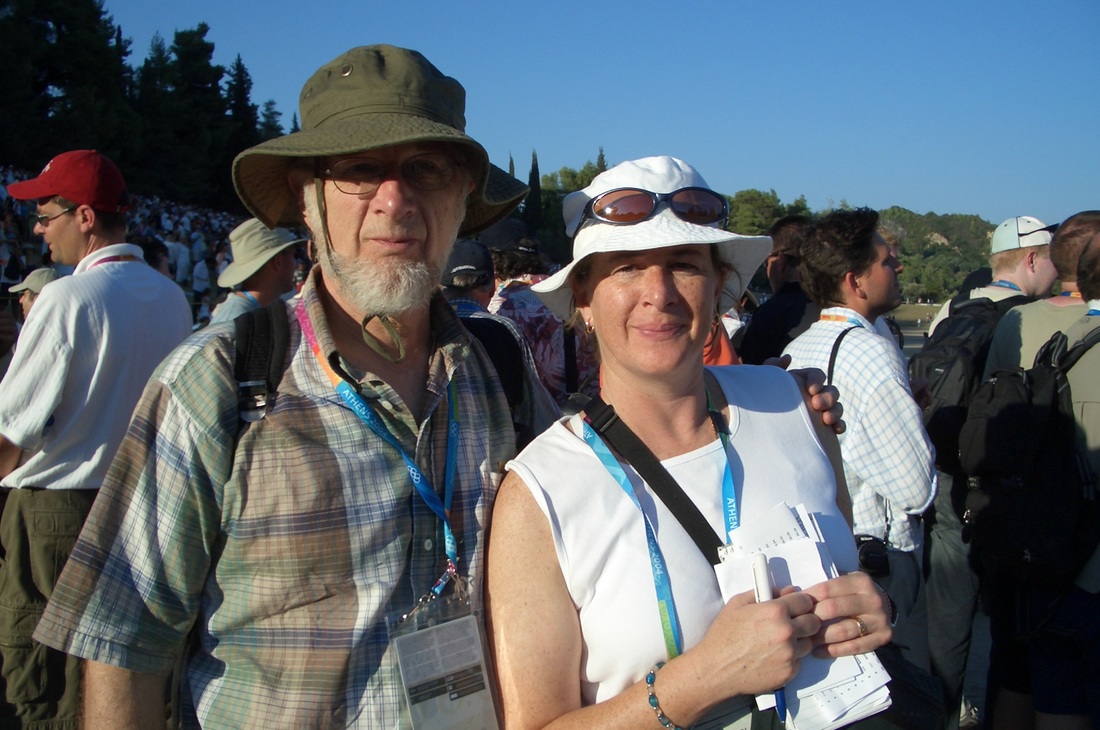|
We used to hang around together on the road – Stanley Cups in Montreal and the Garden, that Italian restaurant in Nagano, the shot-put in Ancient Olympia, and insane nights at Fenway and Yankee Stadium and the Kingdome.
I could be deep in thought in the press box, composing my early-edition column, when a voice would screech right behind my head: “Pop!!!” Everybody in the press box would stop what they were doing. If we were in Boston, she would deposit a roll of Necco Wafers on my desk. She always had a stash. My daughter Laura Vecsey was a sports columnist in Albany and Seattle and Baltimore for more than a decade. I marvelled at her big-sister insight into Junior and Alex and Pedro. One day Jim Palmer, on the air, praised her throwing arm. Life on the road was never the same on the road after she became a political columnist in Harrisburg, Pa., keeping an eye on chicanery and obtuseness in the real world. After she got out of the newspaper business, I realized what a good job she had been doing when I met former Gov. Ed Rendell on a live television show. His first words were, “I miss your daughter.” I bet he does. Last month the editors at the Harrisburg Patriot-News asked her to write a personal tribute to Title IX, to go along with their impressive package on the 1972 legislation. Laura wrote a lovely memory about being a 10-year-old who wanted to play ball, but the only way was with the local Police Athletic League boys’ hardball team. Her entire essay can be accessed via this link: http://blog.pennlive.com/patriotnewssports/2012/06/commentary_title_ix_legislatio.html Laura then told how competition for women got better mostly because of Title IX. My big thrill was when my daughter made the basketball varsity as a sophomore. I was playing on Monday nights in adult recreation up at the high school, and the scoreboard contained the roster of the girls’ varsity. How cool was that, to see the family name up there. In her essay, Laura recalls her responsibility, as the point guard, to set up the star of the team, Debbie Beckford. And if the team got off message, Mr. Beckford, in his lilting Caribbean accent, would shout: “Get the ball to Debbie!” Quite right, too. Debbie became as a Big East star for St. John’s and is now a success in business. The lives and working careers of women have been enriched by varsity sports in the age of Title IX – including my colleague who supplied me with Necco Wafers and screeched “Pop!!!” 7/4/2012 07:29:07 am
No-one would have suspected that the distinguished columnist George Vecsey would resort to the Cheap Tick of keywording "ugly" and "george" just to get on ugly george's 450 million links. Tsk Tsk
Alan Rubin
7/5/2012 12:41:08 am
George
Loved reading Laura's essay, reminds me of her Dad, (of course I don't know her Mom). Working on The Education of All Handicapped Children Act at that time we cheered Title Nine and anti-discrimination provisions in the Vocational Rehab. Act-all part of the most historical change in the nation following the Civil Rights and Voting Rights Acts, since the Declaration and the Emancipation.
Frank Barning
7/6/2012 05:23:59 am
The first time I saw Laura you were proudly pushing her across the Hofstra campus in a baby carriage. Happy birthday a couple of days late.
George Vecsey
7/6/2012 10:58:56 am
Frank: yeah, we lived near campus. My daughter-the-lawyer went to the nursery school there. Great memories. Best, G
Laura Vecsey
7/6/2012 10:09:05 am
Pop!!!
George Vecsey
7/6/2012 11:06:10 am
Remember the night we were driving from Fenway to Long Island? We stopped in that good burrito place -- and caught the great Cub collapse on the tube.
Lauravecsey
7/6/2012 12:08:53 pm
Midnight flight for
George Vecsey
7/6/2012 03:02:48 pm
Right after the bomb in Atlanta in 96, Team Times was out in force.. Dave Anderson said to me, "I just saw your daughter. She was dictating from a pay phone." 8/20/2012 10:58:48 pm
Remember the night we were driving from Fenway to Long Island? We stopped in that good burrito place -- and caught the great Cub collapse on the tube. 1/29/2013 03:40:52 am
I have been teaching a class and we are looking at this subject in the next week. I will be directing my student to look at your post for good information. 10/28/2013 07:09:02 pm
Life on the road was never the same on the road after she became a political columnist in Harrisburg. 9/30/2014 10:38:45 am
Something else you're able to do is to cook nutritious servings for them so you simply actually eat foodstuff that is healthy for the entire body. Comments are closed.
|
Categories
All
|










